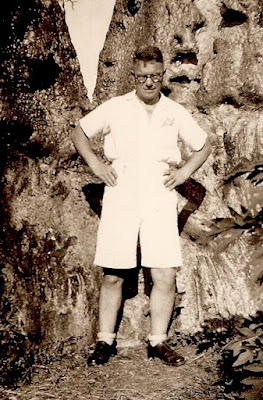Now today I have been reflecting on my family and its links with the British Empire.
 |
| Sailing for India, 1930 |
That said we were on the winning side, born in Britain and going out to the “colonies” as soldier’s seaman and clerks and craftsmen.
My own links are very tenuous.
I was born two years after India and Pakistan became independent, and grew up as Britain shed its empire, a process which was not as peaceful as some history books would record and which some of my teachers found difficult to come to terms with.
So at least two classrooms were adorned with maps of the world with a quarter coloured red of the former British Empire. But to be fair that might have more to do with a lack of resources which condemned us kids to out of date maps and textbooks as well as readers which were already old before the outbreak of the last world war.
Nor did we participate in Empire Day, which was first celebrated in 1902, and became British Commonwealth Day in 1958 and then just Commonwealth Day six years later. Father who was born in 1908 vividly recounted his experiences of the day, which involved much flag waving, long speeches, silly costumes, and lots of “treats”
 |
| Uncle Charles in a far away place date unknown |
One of his sons was migrated to Canada as a British Home Child, having been given the option of crossing the Atlantic at the age of 16 or going to a training ship which was the standard practice for youngsters who were feral and in the judgement of the authorities needed a mix of training and discipline.
To this I can add my one middle name which is Bux which was the maiden name of my German grandmother. Bux I am told is not a common name in Germany and mother always maintained that we had links with India. It was a notion I found hard to accept given that at the very least Germany’s imperial possessions did not include anywhere on the sub-continent.
But then an idle search of shipping records found numerous sailors called Bux all from the Indian sub-continent, and as they the story is still in play.
All of which leaves our uncle who was born in 1903 in Gateshead and died just a little shy of a century later in South Africa. I knew he had worked in both India and east Africa but took it all for granted.
 |
| Uncle Charles, Tanga, 1937 |
The records show at least two trips out to India and one return from Siri Lanka. In between I know he was in different parts of east Africa and while the details are vague and now lost he will have been one of those ex pats who maintained local economies feeding into the bigger picture which was the British empire.
To these stories can be added that of another member of the extended family who as a young sailor spent part of 1944 on the island of Ceylon [Siri Lanka], and as young men do spent part of his spare time photographing the people he came across.
So we were the little people, always believing we were a tad higher in the social order than the indigenous peoples and on trips home not quite able to comprehend how Britain had changed.
Meanwhile in our house in southeast London, we drank tea from India and parts of Africa, used wood and rubber from the far east, ate meat from Australia and New Zealand and sugar from the West Indies.
 |
| Local women, Ceylon, Siri Lanka, 1944 |
All of which adds to those links to empire.
Location; pretty much everywhere.
Pictures; shipping list, 1930, Uncle Charles, date unknown, courtesy of Findmypast, Uncle Charles with possibly his first wife, Tanga, 1937, fromm the Simpson collection, and a group of local women, Ceylon, 1944, courtesy of Bob Ward
No comments:
Post a Comment